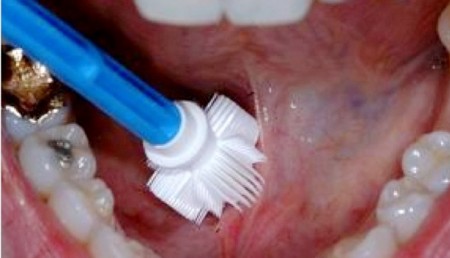Source: http://www.dental-tribune.com/
Author: Dental Tribune International staff
Researchers from British University of Sheffield, and Rice University in Houston, Texas, are conducting a clinical trial on a revolutionary technique for diagnosing oral cancer more quickly and effectively. The “lab on a chip” device could be used by a dentist to determine whether a patient has oral cancer or other abnormalities in less than 20 minutes.

For the examination, cells are removed with a brush and placed on a chip. An analyser yields a result within minutes. (Photo courtesy of Martin Thornhill)
Over the past 18 months, 275 patients have taken part in a trial of the device in order to detect oral cancer in suspicious lesions. The traditional procedure involves using a scalpel to perform a biopsy and off-site laboratory tests that can be time-consuming. The new procedure involves removing cells with a brush, placing them on a chip and inserting the chip into an analyser, which yields a result in a matter of minutes.
This offers a number of benefits, including reduced waiting times and patient visits. Patients are currently being tested with the new device, which is being compared to the standard biopsy procedure to test its accuracy and reliability.
Martin Thornhill, Professor of Oral Medicine at the University of Sheffield and Honorary Consultant in Oral Medicine at Sheffield Teaching Hospitals NHS Foundation Trust, said: “This new technology is an exciting development in the search for quicker and more effective diagnosis of oral cancer. The current procedure we have for making a diagnosis—taking a biopsy—can take a week or more to produce results and can involve extra visits from patients. With our new technology, a brush can be used to remove a few cells painlessly and a result could be produced in minutes.”
Fifty-one-year-old Carole Scott from Gleadless participated in the trial. Scott was diagnosed with oral cancer in December last year, and had a biopsy to confirm the diagnosis. She recently returned for a precautionary test on the other side of her mouth, and this time took part in the trial, having both a test with the new technology and a biopsy.
“For me, there was no comparison between the biopsy and the new test,” Scott stated. “Using the brush was just so much easier—I hardly felt anything. I would recommend it to anyone. I can see real benefits for patients like me in the future. Being able to get your results in just a few minutes, which may well be possible, would save a lot of worry.”
If the trial demonstrates that the new technology is as effective as carrying out a biopsy then it could become standard procedure at dentist surgeries in the future. The technology could also be adapted for other purposes, such as detecting heart attacks, or testing a driver for drugs at the roadside.
The study will be completed later this year, after which the results will be published.

Leave A Comment
You must be logged in to post a comment.